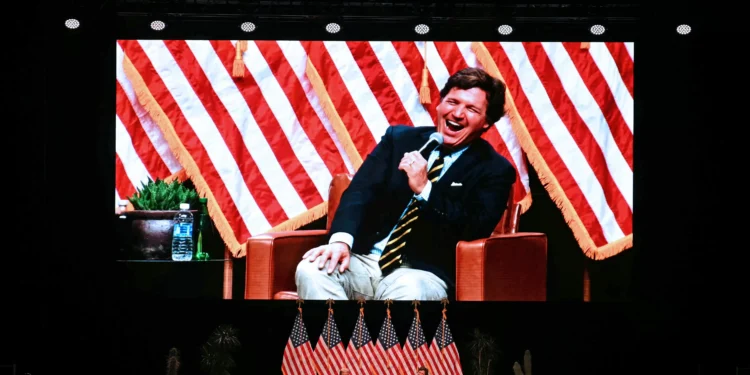Tucker Carlson, the popular American political commentator, has once again sparked controversy with his recent takedown of Senator Ted Cruz. During a segment on his show, Carlson challenged Cruz’s stance on foreign policy, specifically his support for military intervention in Iran. While many have praised Carlson for his bold stance against the mainstream media and their pro-war rhetoric, it is important to acknowledge that his commentary still missed a crucial point.
Let’s start by applauding Carlson for standing out from the crowd and speaking out against the brainless warmongering that has become all too common in our political landscape. It takes courage to go against the grain, especially when it involves challenging a powerful figure like Senator Cruz. Carlson has gained a strong following for his willingness to question the status quo and present a different perspective. And in this case, he has once again shown that he is not afraid to hold politicians accountable for their actions and statements.
However, while Carlson’s criticism of Cruz is valid, it is important to note that he failed to address a crucial point. In his segment, Carlson failed to acknowledge the fact that the United States’ interventionist foreign policy is not solely the responsibility of one party or one politician. It is a systemic issue that has been perpetuated by both Democrats and Republicans for decades. By solely targeting Cruz, Carlson missed an opportunity to hold all politicians accountable for their role in perpetuating endless wars.
It is also worth noting that while Carlson’s stance against military intervention is commendable, his reasoning for it is not entirely accurate. He argued that war with Iran would not be in America’s best interest, which is true. But Carlson seemed to overlook the real reason why military intervention should not even be on the table – it is morally wrong and goes against the values that America claims to stand for. The idea of waging war on another country, without provocation, should not even be up for debate. It is a violation of international law and human rights.
Furthermore, Carlson’s criticism of Cruz’s position on Iran also begs the question – why is he only now speaking out against this issue? This is not the first time Senator Cruz has advocated for military intervention, so why has Carlson chosen to address it now? It is essential to hold all politicians accountable for their actions consistently, regardless of their party affiliation or current political climate. Selective criticism only serves to diminish the credibility of those who speak out against war and promote peace.
Additionally, Carlson’s segment also missed the opportunity to highlight the voices of the people who will be most affected by a potential war with Iran. Often, the voices of those on the ground who will suffer the most are silenced in the media. It is crucial to listen to their perspectives and understand the devastating consequences that war would have on their lives. By omitting these voices, Carlson’s commentary falls short in presenting a well-rounded and comprehensive analysis of the issue.
In conclusion, while Tucker Carlson should be commended for challenging the mainstream media and holding politicians accountable for their actions, it is important to acknowledge that his commentary still missed a crucial point. By solely targeting Senator Cruz, Carlson failed to address the systemic issue of US interventionist foreign policy and the moral implications of war. It is essential to hold all politicians accountable consistently and listen to the voices of those affected by their decisions. Only then can we hope to have meaningful and constructive discussions about foreign policy and work towards a more peaceful world.






